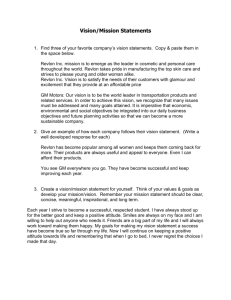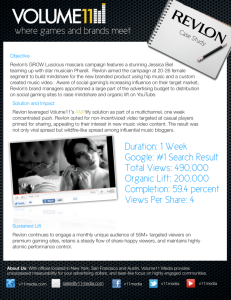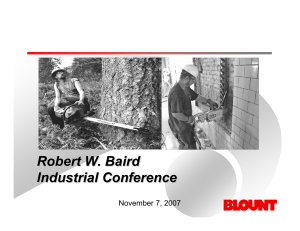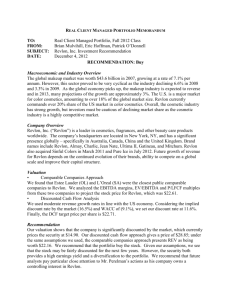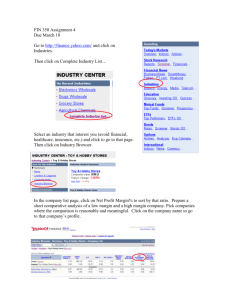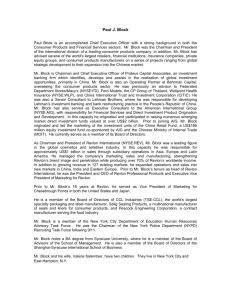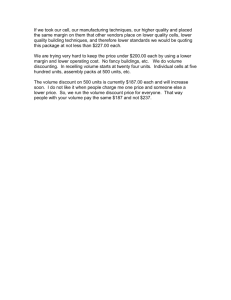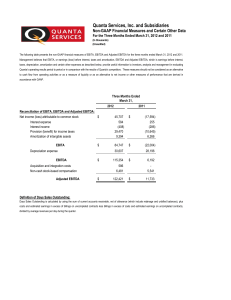Revlon, Inc.
advertisement
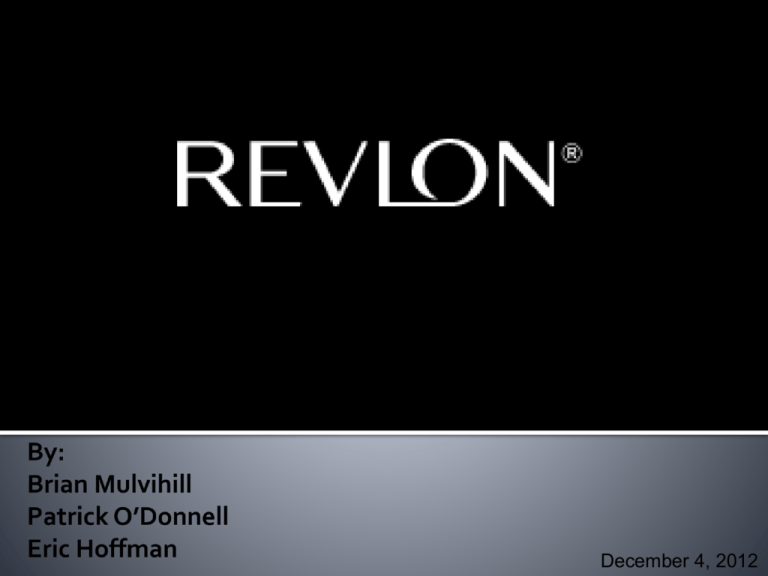
December 4, 2012
Introduction
Portfolio implications
Macroeconomic review
Review of Company
Relevant stock market prospect
Financial analysis
Financial projections
Application of valuation tools
Recommendation
The makeup market was worth $43.6 billion in 2007 growing at a rate of 7.1% per
annum. However this sector proves to be very cyclical. The market value growth
rate declined to 6.6% in 2008 and even turned negative to -3.3% in 2009. As the
economy picks up, the market is expected to reverse and in 2011 many
projections of the growth are approximately 3%
Decline in volume growth rate in 2008-09: The number of makeup users grew at a
stable 1.2% (global population growth rate). The growth rate of consumption per
user dropped from 1.4% in 2007 to 0.7% in 2008 and further down
It has been noted that the average per-unit price has declined during the
recessionary times as consumers substituted lower-priced brands of a product on
account of reduced disposable incomes.
Source: Consumer Confidence Jumps to Highest Level Since 2008 - http://www.bespokeinvest.com
US is a major market for color cosmetics, amounting to over 18%
of the global market size and Revlon commands over 20% share of
the US market in color cosmetics.
Anti-aging creams and anti-cellulite skin care products are in high
demand among an aging population in the developed countries,
notably Japan (with the oldest demographic), the US, and Western
Europe.
REV was founded in 1932. The company markets its
products through its own stores, mass volume retailers,
chain drug and food stores, and the internet
Product with volatiles sales periods, largely depending on
the popularity of the products and advertising expenses
Recent growth primarily though acquisitions
“We are focused on the five elements of our
business strategy, specifically, to (i) build our
strong brands; (ii) develop our organizational
capability; (iii) drive our company to act
globally; (iv) increase our operating profit and
cash flow; and (v) improve our capital
structure. “
▪ Alan T. Ennis, President and Chief Executive Officer
After a significant bidding war in 1986, Ronald Perelman
paid $1.8 billion to Revlon's shareholders for control of
Revlon, which is now 75% owned by Perelman’s MacAndrews
and Forbes Holdings.
Perelman had Revlon sell numerous divisions and replaced
most management
Following Perelman’s acquisition, the company did not
report a profitable quarter until 2007
Brand names
Products
Revlon
Skin care
Almay
Bath and Body
Charlie
Cosmetics
Jean Nate
Hair Care
Ultima II
Fragrance Products
Gatineau
Mitchum
Bargaining power of customers: High
-Significant number of products offered by other companies.
-WMT is primary customer (~10% of sales)
Threat of New Entrants: Low
-Continually low margins reduce incentive
Threat Substitute Products: High
-Significant number of products
Competition within rivalry: High
-Especially during recessionary times
Bargaining Power of Suppliers: Low
-Chemicals, products, and packaging are provided at low margins
-Evident in high gross margins at companies in industry
Strengths
• Strong Positioning
• Strong Growth
Prospects
Weaknesses
• Limited Customer base
• Limited Operating
Margin
Opportunities
• Innovation
• EMEA
Threats
• Highly competitive
market
• Consumer Preferences
Current share price = $14.90
Source: Yahoo! Finance – Rev 12/3/2012
Revlon stock performance vs. competitors
Source: Google.com – REV 12/03/2012
1.
2.
3.
4.
Innovative, high-quality, consumer-preferred
brand offering
Effective brand communication
Appropriate levels of advertising and
promotion
Superb execution with retail partners
1. Building our strong brands
2. Developing our organizational capability
3. Driving company to act on a global scale
4. Increasing our operating profit and cash flow
5. Improving our capital structure
Source: 2011 10-K
Sales by Region
800
700
600
500
400
300
200
100
0
United States
Asia Pacific
Europe, Middle East and
Africa
2011
2010
2009
Latin America
Canada
•
Net Sales - $1,381.4 million as of 2011
• United States – 55%
• Outside U.S. – 45% (Canada, Australia, China, and U.K.)
•
Increased $60 million (4.5%) year over year
• Driven by the inclusion of Sinful Colors in March 2011
• Improved profitability offset by June 2011 fire at Venezuela facility
•
Higher Net Sales expected for 2012 fiscal year
after the acquisition of Pure Ice in July
Source: 2011 10-K
•
SG&A expenses increased $18.9 million
in 2011
• Driven by $17.8 million higher general and
administrative expenses
• Fluctuations in foreign currencies
Source: 2012 10-Q
Balance Sheet
Data
Balance
Sheet Data
Reported Income Statement
2011A
Fiscal Year Ending December 31,
2009A
2010A
Cash and Cash Equivalents
LTM
2011A
9/30/2012
9/30/2012
$101.7
$45.2
Accounts Receivable
212.0
195.7
Inventories
111.0
143.4
94.0
105.9
$518.7
$490.2
98.9
99.9
194.7
344.8
217.7
375.8
$1,157.1
$1,183.6
Sales
$1,295.9
$1,321.4
$1,381.4
$1,394.6
COGS
474.7
455.3
492.6
501.4
Gross Profit
SG&A
Other (Income)/Expense
$821.2
629.1
21.3
$866.1
666.6
(0.3)
$888.8
685.5
-
$893.2
700.0
21.0
Property, Plant and Equipment, net
EBIT
Interest Expense
$170.8
112.5
$199.8
113.6
$203.3
107.3
$172.2
89.2
Goodwill and Intangible Assets
Other Assets
$86.2
$96.0
$83.0
Total Assets
(247.2)
-
36.8
-
36.0
-
Accounts Payable
89.8
102.7
Accrued Liabilities
231.7
266.5
Pre-tax Income
$58.3
Prepaids and Other Current Assets
Total Current Assets
Income Taxes
Minority Interest
8.3
-
Preferred Dividends
1.5
6.4
6.4
6.4
$48.5
$327.0
$52.8
$40.6
Other Current Liabilities
51.7
$0.94
52.3
$6.25
52.3
$1.01
52.4
$0.78
Total Debt
Other Long-Term Liabilities
Net Income
Weighted Avg. Diluted Shares
Diluted EPS
Total Liabilities
Noncontrolling Interest
Preferred Stock
Shareholders' Equity
Total Liabilities and Equity
-
-
1,179.3
300.8
1,177.1
269.7
$1,801.6
$1,816.0
-
-
48.4
48.3
(692.9)
(680.7)
$1,157.1
$1,183.6
Mid-Year Convention
Projection Period
2012
Sales
% growth
COGS
2013
2014
CAGR
2015
2016
('11 - '16)
$1,409.0
2.0%
507.3
$1,430.2
1.5%
514.9
$1,458.8
2.0%
525.2
$1,502.5
3.0%
540.9
$1,547.6
3.0%
557.1
2.3%
Gross Profit
$901.8
$915.3
$933.6
$961.6
$990.5
2.2%
% margin
SG&A
64.0%
634.1
64.0%
643.6
64.0%
656.4
64.0%
676.1
64.0%
696.4
EBITDA
% margin
Depreciation & Amortization
$267.7
19.0%
63.4
$271.7
19.0%
64.4
$277.2
19.0%
65.6
$285.5
19.0%
67.6
$294.0
19.0%
69.6
2.2%
EBIT
% margin
Taxes
$204.3
14.5%
77.6
$207.4
14.5%
78.8
$211.5
14.5%
80.4
$217.9
14.5%
82.8
$224.4
14.5%
85.3
2.0%
EBIAT
$126.7
$128.6
$131.1
$135.1
$139.1
2.0%
Plus: Depreciation & Amortization
Less: Capital Expenditures
Less: Increase in Net Working Capital
Unlevered Free Cash Flow
Discount Rate
Discount Period
Discount Factor
Present Value of Free Cash Flow
63.4
(14.1)
8.1
64.4
(14.3)
(0.6)
65.6
(14.6)
(0.8)
67.6
(15.0)
(1.2)
69.6
(15.5)
(1.2)
$184.0
$178.1
$181.4
$186.5
$192.1
1.0
0.90
2.0
0.80
3.0
0.72
4.0
0.64
5.0
0.58
$164.9
$143.0
$130.6
$120.3
$111.0
Implie d Equity Va lue a nd Sha re Price
Enterprise Value
Less: Total Debt
Less: Preferred Securities
$2,369.3
(1,177.1)
(48.3)
Less: Noncontrolling Interest
Plus: Cash and Cash Equivalents
45.2
Implie d Equity Va lue
$1,189.1
Fully Diluted Shares Outstanding
52.4
Implie d Sha re Price
$22.71
Implied Share Price
WACC
Exit Multiple
11.0%
11.5%
12.0%
12.5%
13.0%
9.0x
20.44
19.61
18.80
18.01
17.24
9.5x
22.11
21.24
20.39
19.57
18.77
10.0x
23.77
22.87
$21.99
21.13
20.29
10.5x
25.44
24.50
23.58
22.69
21.82
11.0x
27.11
26.13
25.18
24.25
23.34
Projection Period
2013
$1,409.0
2.0%
507.3
2014
$1,430.2
1.5%
514.9
2015
$1,458.8
2.0%
525.2
2016
$1,502.5
3.0%
540.9
2017
$1,547.6
3.0%
557.1
Gross Profit
% margin
SG&A
$901.8
64.0%
634.1
$915.3
64.0%
643.6
$933.6
64.0%
656.4
$961.6
64.0%
676.1
$990.5
64.0%
696.4
EBITDA
% margin
Depreciation & Amortization
$267.7
19.0%
63.4
$271.7
19.0%
64.4
$277.2
19.0%
65.6
$285.5
19.0%
67.6
$294.0
19.0%
69.6
EBIT
% margin
Taxes
$204.3
14.5%
65.0
$207.4
14.5%
66.0
$211.5
14.5%
67.3
$217.9
14.5%
69.3
$224.4
14.5%
71.4
EBIAT
$139.3
$141.4
$144.2
$148.6
$153.0
Sales
% growth
COGS
Plus: Depreciation & Amortization
Less: Capital Expenditures
Less: Increase in Net Working Capital
Unlevered Free Cash Flow
Present Value of Free Cash Flow
Current Price
Implied Discount Rate
63.4
(14.1)
8.1
64.4
(14.3)
(0.6)
65.6
(14.6)
(0.8)
67.6
(15.0)
(1.2)
69.6
(15.5)
(1.2)
$196.7
$190.9
$194.5
$200.0
$206.0
$167.4
$138.3
$119.9
$104.9
$92.0
$15.00
17.50%
Unrealistic discount rate implied by current market price after considerable
reduction in debt load and very conservative revenue growth assumptions.
Enterprise Value
Target Company
Revlon, Inc.
Equity
Value
$778
EnterpriseLTM EBITDA LTM
Value
Margin EBITDA
NTM
EBITDA
Market Value
Greenblatt Ratio
LTM
NTM
LTM
Net IncomeNet IncomeLFCF
Earnings Yield
$1,958
16.55%
8.48x
6.73x
18.96x
8.96x
4.8x
10.32%
$22,926 $23,242
$82,088 $81,785
17.84%
19.33%
13.31x
15.59x
12.1x
NM
26.12x
24.93x
21.53x
NM
34.26x
40.09x
6.20%
5.39%
15.59x
14.45x
14.45x
13.31x
12.10x
12.10x
12.10x
12.10x
26.12x
25.53x
25.53x
24.93x
21.53x
21.53x
21.53x
21.53x
40.09x
37.18x
37.18x
34.26x
Comparable Companies
The Estée Lauder Companies Inc.
L'Oreal SA
High
Average
Median
Low
Implied Share Price
LTM EBITDA
$234.1
10.0x
EBITDA Multiple
Enterprise Value
Less: Total Debt
Less: Preferred Securities
$2,340.6
1177.1
48.3
Plus: Cash and Cash Equivalents
Equity Value
45.2
$1,160.4
Fully Diluted Shares Outstanding
52.357
Implied Share Price
$22.16
Buy 500 shares at Market
~$7,450
DCF - $22.71
Comps - $22.16
Significantly undervalued due to Perelman factor,
present price = $14.90
